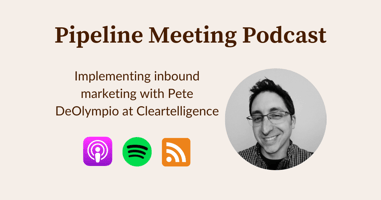Account-Based Marketing (ABM) is an emerging go to market tactic used in enterprise sales. Dan...
6 Tips for Implementing a Sales Methodology in Your CRM
We've been helping B2B companies level up their sales processes with our fractional sales and CRM implementation services. Along the way, we've asked founders, marketing experts, and CEOs this question for their best strategies.
From identifying leads to making it easy for sales reps, there are several recommendations that may help you implement a winning sales methodology in the future. Using sales methodologies like these is a hallmark of a sophisticated sales team.
Here are six tips for the proper implementation of a sales methodology in a CRM:
- Identify Lead Types You Want to Capture
- Add BANT Criteria to All Deals
- Implement Field Dependencies
- Map an Implementation Plan and Make People Accountable
- Have Your CRM Answer Human-like Questions
- Make It Easy for Your Sales Reps
Identify Lead Types You Want to Capture
"The first step to implementing a B2B sales methodology in your CRM is to identify the different leads you want to capture. For example, you may have prospective customers, partners, and vendors. Next, you'll want to identify the common characteristics of these leads.
Once you have identified the common characteristics, you can create custom fields in your CRM to capture this information. You can then use this information to segment your leads and track their progress through the sales funnel.
This will help you better understand your target audience and improve your outreach and follow-up efforts. By following this bottoms-up approach, you can best determine which sales methodology best suits the leads you have in your CRM.
For instance, if you find that you have multiple lead types that require significant product education, maybe a SANDLER methodology would work best for your business."
— Matthew Ramirez, CEO, Rephrasely
Add BANT Criteria to All Deals
"We score every sales opportunity with the 4 BANT Criteria: Budget, Authority, Need, and Timing. Each of these 4 factors gets a score of 1-4, and then we add it up, so we know that the best opportunities we should focus on have a total score closer to 16 than 1. It simplifies and clarifies which opportunities deserve more time and energy than others."
— Ed Stevens, Founder and CEO, Preciate
Implement Field Dependencies
"One tip for implementing B2B sales methodologies in your CRM is to explain the strategy to the team and the outcome you're trying to achieve from it.
Then make sure that the methodology becomes a part of the process for a lead to be accepted into the CRM by setting up field dependencies during lead entry into the CRM."
— Madhav Bhandari, Head of Marketing, Early Stage Marketing
Map an Implementation Plan and Make People Accountable
"A successful CRM implementation cannot occur without coupling it with an effective CRM strategy to make B2B sales highly effective.
The procedure involves breaking down your CRM project into manageable steps with associated timelines. The timeline guidelines protect you from losing track of the implementation period set. Having a manager will ensure deadlines are met and goals are achieved.
Assigning someone as a super-user who will be responsible for all things CRM will provide a go-to person for any problems or questions during or after implementation. Having this roadmap in place will ease your CRM implementation."
— Yongming Song, CEO, Live Poll for Slides
Have Your CRM Answer Human-like Questions
"CRMs should be less like a database and more like a human. A CRM that can answer questions like "who are my best-performing customers?", "how many customers have I gained in the last 30 days?", and "what are my highest value customers?" can be a useful resource.
A CRM can also be a precious resource for identifying trends and opportunities. A CRM that can provide reports on "customers that have recently canceled", "customers who have not made a purchase in over 6 months", and "customers who have made over one recent purchase in the last 30 days" can be a great way to identify sales leads and opportunities.
A CRM should be able to act like a human and answer questions, as well as provide insights into your customers and your sales opportunities. A CRM that can do this can be a great sales resource for your business!
— Luciano Colos, Founder and CEO, PitchGrade
Make It Easy for Your Sales Reps
Make it easy for your sales reps to input the data from the sales methodology into the CRM tool. Within each opportunity, implement a template that includes the sections for BANT (Budget, Authority, Need, and Timeline)—or whatever sales methodology you use.
Make these sections mandatory to fill out prior to publishing the opportunity, so your sales team has to fill these out when creating a new deal in your CRM. This will reduce junk in your pipeline and ensure that they fill your pipeline with quality opportunities.
— Scott Krager, Founder, TubeSplit.com
That's all for now. If you have any tips you'd recommend, please send them our way!



